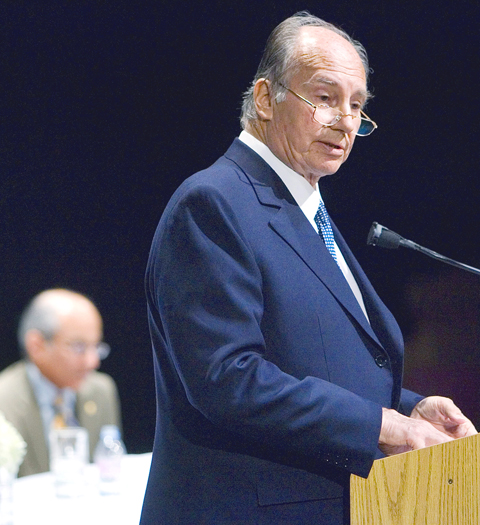The Aga Khan, billionaire philanthropist and spiritual leader of 20 million Ismaili Muslims worldwide, ended an eight-day tour of the US stressing the importance of tolerance and education as he announced his initiative to establish schools in Africa, the Middle East and Asia.
His trip — which also included stops in Texas, Illinois and California — was part of the Shia Ismaili Muslim commemoration of the Golden Jubilee, which marks the Aga Khan’s 50th year as imam of the religious sect.
In a speech on Friday at a high school in Atlanta, he sought to raise awareness about the Aga Khan Academies, a US$1 billion education initiative to build 18 schools in 14 countries in Africa, Central and South Asia and the Middle East.

PHOTO: AP
The project grew out of a need to develop well-educated, global citizens who would make a difference in their communities, the Aga Khan told the audience.
“Our Academies Program is rooted in the conviction that effective indigenous leadership will be the key to progress in the developing world, and as the pace of change accelerates, it is clear that the human mind and heart will be the central factors in determining social wealth,” he said.
“Too many of those who should be the leaders of tomorrow are being left behind today. And even those students who do manage to get a good education often pursue their dreams in far off places and never go home again.”
The Aga Khan, who was born and educated in Switzerland, is a Harvard-educated businessman who is a descendant of the Prophet Mohammed. In his capacity as imam, he is also chair of the Aga Khan Development Network, a group of private, non-denominational development agencies focused on social, cultural and economic development.
The Aga Khan Academies are an initiative of the network’s Aga Khan Education Services, and under the plan, 18 schools are planned in 14 countries at a cost of about US$50 million per school — a commitment of nearly US$1 billion. The first school opened in Mombasa, Kenya, in 2003, and others are planned in India, Bangladesh, Mozambique, Madagascar, Afghanistan, Pakistan, Syria, Tanzania and Uganda.
The academy curriculum is based on the International Baccalaureate (IB) program, which is derived from a program rooted in academics, critical thinking and a respect and appreciation for cultural diversity and is the most widely recognized pre-university educational program.
The program is celebrating its 40th anniversary in Atlanta this week and the Aga Khan addressed the organization as its speaker for the Peterson Lecture, named for the program’s first director general.
Previously rooted in Judeo-Christian communities, the Aga Khan Academies represent the first expansion of the IB curriculum into Muslim cultures.
“Squaring the particular with the global will require great care, wisdom and even some practical field testing, to ensure that it is really possible to develop a curriculum that responds effectively to both the global and the tribal impulses,” the Aga Khan said. “The people with whom we will be dealing will present different challenges than before.”
To that end, there will be an emphasis on inclusion, ethics, global economics, world culture and comparative political systems, the Aga Khan told the crowd of educators, administrators, followers and observers.

VAGUE: The criteria of the amnesty remain unclear, but it would cover political violence from 1999 to today, and those convicted of murder or drug trafficking would not qualify Venezuelan Acting President Delcy Rodriguez on Friday announced an amnesty bill that could lead to the release of hundreds of prisoners, including opposition leaders, journalists and human rights activists detained for political reasons. The measure had long been sought by the US-backed opposition. It is the latest concession Rodriguez has made since taking the reins of the country on Jan. 3 after the brazen seizure of then-Venezuelan president Nicolas Maduro. Rodriguez told a gathering of justices, magistrates, ministers, military brass and other government leaders that the ruling party-controlled Venezuelan National Assembly would take up the bill with urgency. Rodriguez also announced the shutdown

Civil society leaders and members of a left-wing coalition yesterday filed impeachment complaints against Philippine Vice President Sara Duterte, restarting a process sidelined by the Supreme Court last year. Both cases accuse Duterte of misusing public funds during her term as education secretary, while one revives allegations that she threatened to assassinate former ally Philippine President Ferdinand Marcos Jr. The filings come on the same day that a committee in the House of Representatives was to begin hearings into impeachment complaints against Marcos, accused of corruption tied to a spiraling scandal over bogus flood control projects. Under the constitution, an impeachment by the

Exiled Tibetans began a unique global election yesterday for a government representing a homeland many have never seen, as part of a democratic exercise voters say carries great weight. From red-robed Buddhist monks in the snowy Himalayas, to political exiles in megacities across South Asia, to refugees in Australia, Europe and North America, voting takes place in 27 countries — but not China. “Elections ... show that the struggle for Tibet’s freedom and independence continues from generation to generation,” said candidate Gyaltsen Chokye, 33, who is based in the Indian hill-town of Dharamsala, headquarters of the government-in-exile, the Central Tibetan Administration (CTA). It

China executed 11 people linked to Myanmar criminal gangs, including “key members” of telecom scam operations, state media reported yesterday, as Beijing toughens its response to the sprawling, transnational industry. Fraud compounds where scammers lure Internet users into fake romantic relationships and cryptocurrency investments have flourished across Southeast Asia, including in Myanmar. Initially largely targeting Chinese speakers, the criminal groups behind the compounds have expanded operations into multiple languages to steal from victims around the world. Those conducting the scams are sometimes willing con artists, and other times trafficked foreign nationals forced to work. In the past few years, Beijing has stepped up cooperation